How Celebrity Chefs Solve Common Thanksgiving Turkey Conundrums
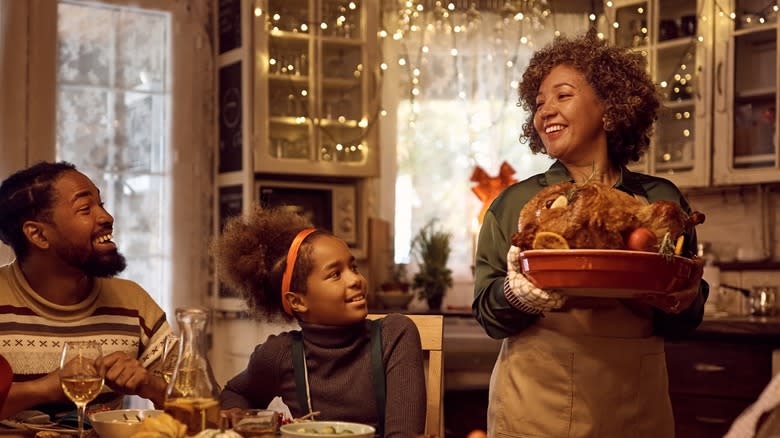
If you're anything like us, confidently taking on Thanksgiving dinner can be stressful, especially with so many conflicting sources of information available. From well-meaning family and friends to the internet, most of us are bombarded with Thanksgiving tips and tricks -- but which methods are actually best?
We've been there, and we get it. Thankfully, we've been able to track down advice from the most reputable celebrity chefs to begin unlocking the code to the ever-so-confusing (and often intimidating) world that is Thanksgiving dinner. From age-old questions to new-school techniques, we've done our best to round up the answers to all the burning questions most of us have when it comes to how to achieve a turkey-day masterpiece -- effortlessly.
Ready to learn more? If so, stay tuned. We've got a whirlwind of expert advice headed your way from some of the biggest names in the food industry. Just know that these culinary geniuses don't always agree; it'll be up to you to decipher who you're willing to trust in some cases. Let's dig in!
Read more: The Biggest Scandals To Ever Hit The Food Network
How Long Should You Rest A Turkey Before Carving?

Resting a turkey before carving is a must, as doing so allows the juices in the meat to redistribute, yielding a more succulent and scrumptious result. Thus the real issue isn't whether or not you should allow the turkey to rest, but rather, how long you should do it. It's likely that you and your guests will be hungry by the time the turkey is finished, and waiting too long before enjoying a turkey may feel irritating to some – to say the least. Still, allowing a turkey to sit for at least 15 minutes is pretty standard, with some experts suggesting you wait even longer for best results.
So, how long do celebrity chefs recommend you wait? According to Alton Brown, 15 minutes is just right. Ina Garten recommends 20 minutes, and Gordon Ramsay? He recommends you wait anywhere from 45 minutes to 3 hours before slicing in. Man oh man, we're not sure we could wait that long, but according to Ramsay, the payoff is well worth it!
Foil Or No Foil?
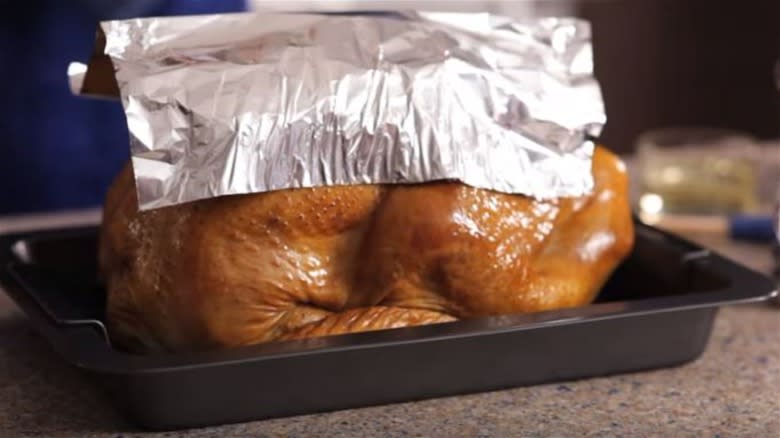
Most celebrity chefs agree using foil at some point when making a Thanksgiving turkey is indeed necessary. Where they differ, however, is when, exactly, to put that foil to use. According to Giada De Laurentiis, foil is needed throughout the entire cooking process. Her recipe involves the high-maintenance approach of covering, uncovering, and recovering the bird both during and after cooking. Anne Burrell, on the other hand, also believes in covering a turkey with foil, but only after it develops the right color. Lastly, we've discovered that several chefs, including Bobby Flay, don't use foil at all during the cooking process. Instead, they use foil only after roasting -- to keep it juicy, warm, and protected until it's time to carve.
Thus, whether or not you use foil on a turkey is totally dependent on the recipe you follow and the results you want to see. Obviously, using foil the entire time isn't recommended, as this would result in pale and unsatisfying skin. Instead, using foil at various times throughout the cooking process or even at the very end may help retain juices and keep the turkey from over-browning, making it well worth its use.
Is A Brine Actually Necessary?
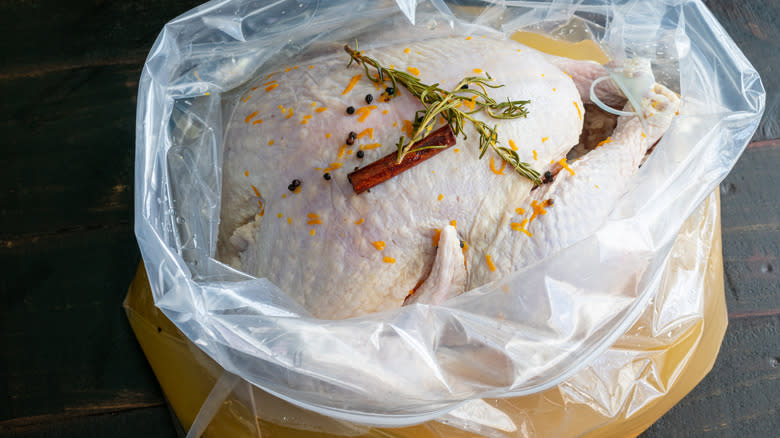
Brining isn't always necessary, but most chefs agree it can make the bird taste better. Still, there are plenty of turkey day recipes out there that don't require brining at all, meaning it may or may not be necessary for achieving the best results.
Gordon Ramsay is one of those chefs who, unsurprisingly, seems to go against the grain when it comes to brining meat. His turkey recipe, despite being absolutely delicious, requires no extra time spent submerging the turkey in brine. On the other hand, Carla Hall recommends you brine your turkey at least 6 hours to overnight, while Martha Stewart recommends 24 hours for the best result.
You should also note that people like to add varying types of ingredients to their brine to make it that much better. Though you could always use a simple salt and water solution, certain chefs, like Alton Brown, prefer to douse the water in ginger, allspice berries, stock, and other goodies. Which ingredients you use will depend on what flavors you'd like to impart to your turkey meat – that is, if you choose to partake in the brining process at all!
Is It Okay To Stuff A Turkey Cavity?
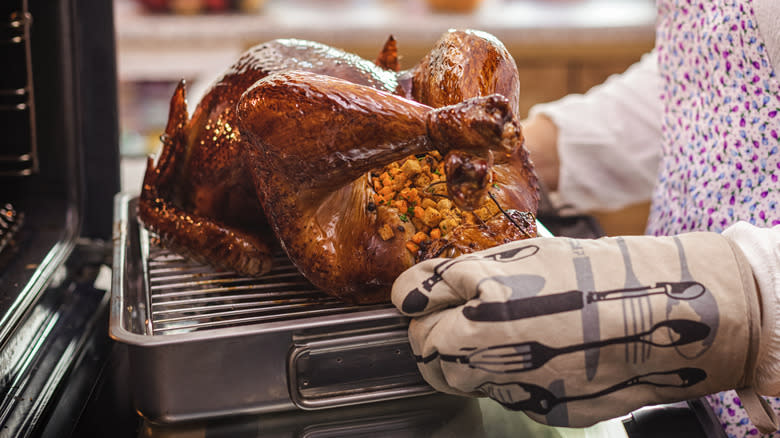
Stuffing a turkey has gotten a bad rep for being unsafe due to the possibility of dangerous bacteria still lingering even after the turkey has reached 165 degrees Fahrenheit. Nevertheless, many chefs out there still recommend at least stuffing the bird's cavity with herbs, lemon, and other aromatics for the purpose of flavoring the meat.
While we're sure there are a few chefs out there who still may risk cooking actual stuffing inside a turkey cavity, we haven't yet run across many who do. Chefs like Alton Brown insist that cramming your bird with stuffing is highly unsanitary, while Patrick and Gina Neely don't see a need to put anything in the bird cavity at all. Gordon Ramsay still stuffs his bird, but only with those aromatics we discussed earlier – it doesn't appear that he's subscribed to the idea of cooking stuffing within a turkey, either.
All of this is to say that while stuffing a bird with certain fruits, veggies, or herbs may indeed impart flavor to the meat, adding actual stuffing to it may make someone ill. Cook your stuffing separately to prevent a sickly disaster on Thanksgiving day. You're welcome!
What's The Best Oven Temperature To Cook A Turkey?
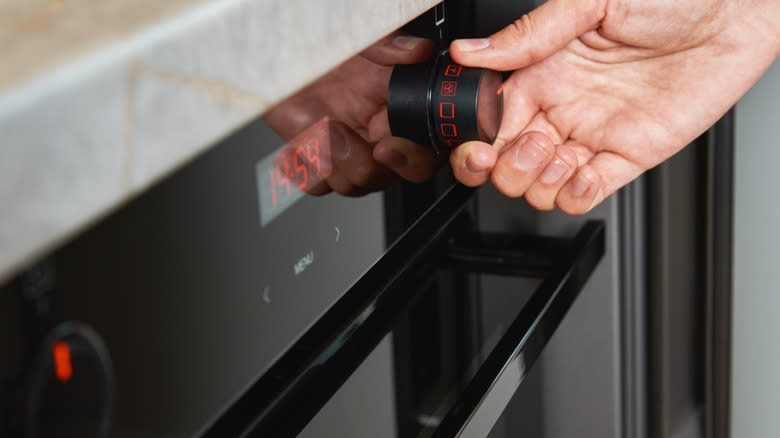
When it comes to what temperature to cook a turkey, the truth of the matter is that the answer hinges on a few things. Just like when cooking any other kind of meat, what temperature you use will depend on your oven, the meat type, and the amount of time you plan to cook it. Because turkey meat is lean, lower and slower is usually the best option for cooking it. The question is, just how low and how slow should this be?
Honestly, we've seen a variety of answers from celebrity chefs on this issue. Chefs like Bobby Flay start off with a very high heat -- 450 degrees Fahrenheit to be exact -- before reducing the heat and allowing it to cook at 350 degrees Fahrenheit from there. Ina Garten, on the other hand, keeps her turkey temperature constant, claiming that 350 degrees Fahrenheit is ideal for the entire roasting time until juices run clear. Finally, Ree Drummond offers her advice, which is quite possibly the longest cook time we've ever seen. According to this Pioneer Woman, slow and steady wins the race at a temperature of 275-350 degrees Fahrenheit throughout the entire cooking process. This means the turkey could take up to 5 hours or more, depending on the size of your turkey. Eek!
Should I Rinse The Turkey Before Cooking?

Washing virtually any kind of poultry before cooking has been a controversial subject, and, interestingly, its controversy remains even among celebrity chefs. For example, both Martha Stewart and Giada De Laurentiis admit to doing their own version of washing a turkey, despite USDA warnings against the practice. Martha douses hers in a bath full of water and vinegar, while Giada encourages readers of her recipe to rinse the turkey with water before beginning.
Other chefs, including Rachael Ray, make no mention of washing or rinsing a turkey before cooking, so we're assuming these experts don't deem it needed. Either way, we know for certain that the USDA expressly forbids washing a turkey and even claims that doing so may not be as effective at removing bacteria as one would think. Additionally, washing your bird increases the chance of spreading germs to surfaces through cross-contamination and thus may not be worth the effort, despite common belief.
Is Butter Or Oil Better For Turkey Skin?
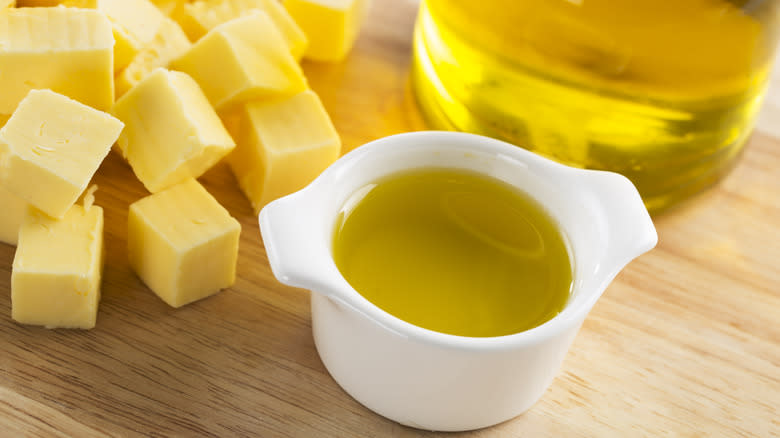
Another common Thanksgiving conundrum you may find yourself faced with is whether to slather your turkey in butter or oil. This classic question really comes down to preference, as either option will render different results, both of which can prove quite satisfying.
According to Carla Hall, all you really need is olive oil. Olive oil helps the skin brown and become crispy, while also preventing the skin from totally drying out. Even so, using butter, as Gordon Ramsay suggests, would impart more flavor, though it might admittedly be a more tedious and messy process, especially given his bare-hands technique.
One final option when deciding to use butter or oil is to simply use neither. When looking over Guy Fieri's unique recipe, we see no mention of adding butter or oil to the skin. Thus, the assumption is that he finds neither one particularly necessary to yield a delicious and juicy turkey. Take it for what you will – opinions are split on this one!
Should I Roast The Turkey With The Breast Up Or Down?
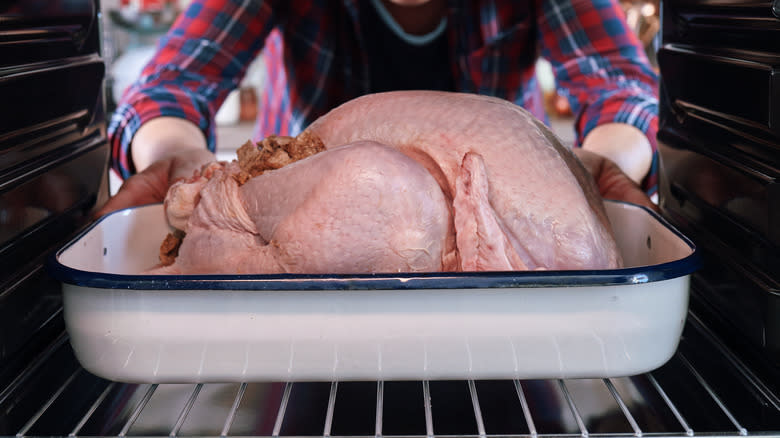
Though roasting a turkey breast-side up or down can come down to a matter of opinion, the USDA recommends always cooking your turkey breast-side up. Its reasoning is that flipping a turkey can be dangerous and may even result in an unattractive, ripped, torn deconstructed turkey. With that said, some celebrities claim otherwise, with Martha Stewart being one of them.
According to her website, the reason you'd want to cook a turkey breast side down is so that the juices from the turkey work their way into the breast of the meat, yielding a juicier result. This breast-side down method won't be the most attractive or traditional way of dishing up a turkey, but in the end, it could render results that far exceed what the turkey looks like. And as the USDA advises, we, too, would not advise you to flip a turkey once it's cooked this way. That breast that's been simmering in juices won't be beautifully golden anyway, so you'll have to opt for a non-traditional presentation if you decide to go the breast-down route.
How Often Should I Baste My Turkey?
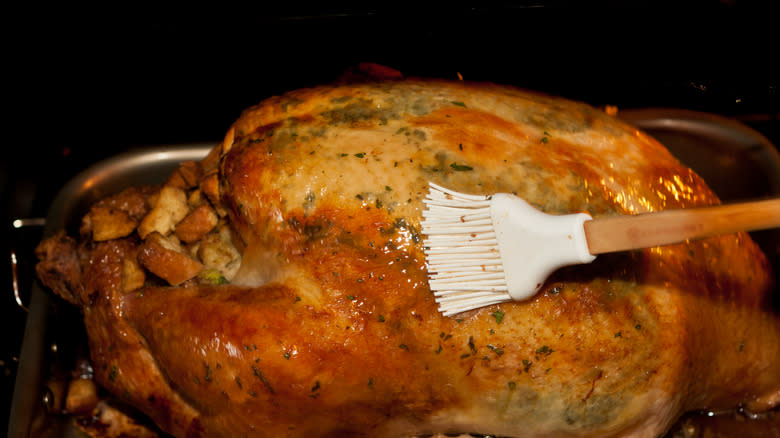
Opening your oven to baste a turkey every 30 minutes to an hour may seem like a total pain, and indeed, it can be. Most celebrity chefs, including Tyler Florence, encourage their fans to baste the turkey at least every half hour, but you may be surprised to know how much the opinions about basting vary from chef to chef.
Martha Stewart, for example, loves using the cheesecloth method to keep her turkey juicy and moist. To do this, you'll dip a cheesecloth into wine and butter and lay the soaked cheesecloth on top of the turkey for a portion of the cooking time. Like Chef Florence, she also recommends basting the bird every 30 minutes, but only during the last hour.
In contrast, Alton Brown breaks all the rules by declaring basting a waste of time. According to him, constantly opening the oven for basting only causes the turkey to take longer to cook and also, supposedly, adds no flavor to the meat. We're honestly not sure we believe that basting has virtually no positive attributes, but as you can see, basting is quite controversial, despite being an age-old technique.
Should I Spatchcock A Turkey?

Spatchcocking a turkey isn't necessary, but by golly, if you've got the patience to do it, it could save you a lot of time on the backend. For those of you wondering what spatchcocking is, allow us to fill you in. Spatchcocking is a technique that involves taking out the spine of a turkey before flattening out the cavity to make the bird lay flat. It is a very odd and non-traditional way of serving up the Thanksgiving entrée, but it also cooks in half the time, making it a worthy technique.
Andrew Zimmerman, a well-known celebrity chef, utilizes this method to make cooking up Thanksgiving turkey even easier. In addition to removing the spine, he also admits to removing the thighs and legs to cook separately, though whether or not you choose to go this far is up to you. Either way, chefs who have attempted this method claim the results are pretty incredible. Who knew?
Should I Deep-Fry My Turkey?
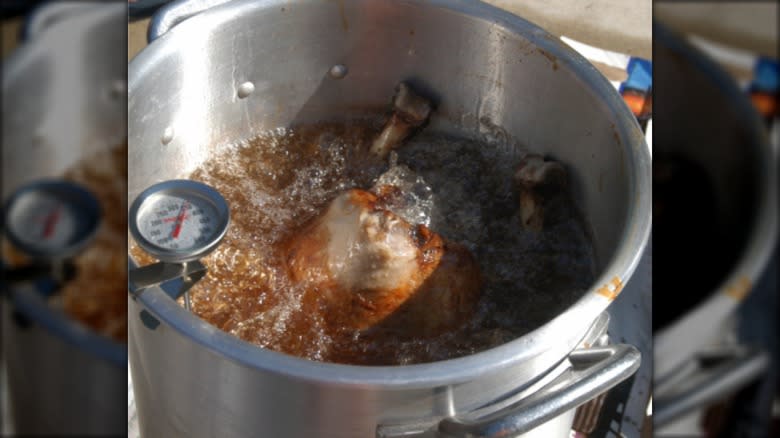
Deep-frying a turkey is a long-standing tradition among some families, but for others, it may seem as nontraditional as it is unsafe. While there are many warnings out there about the potential dangers of frying a turkey, very few can contend with the fact that doing so can render delicious results.
So, should you deep-fry your turkey? According to certain celebrity chefs, it's totally an option. We've found recipes from Alton Brown for this yummy rendition of Thanksgiving turkey, and we must say, it sounds delish. Not only this, but the directions make it seem like the process is relatively simple compared to the dizzying amount of steps involved in baking a traditional turkey in the oven. All in all, this easy and delicious method of cooking a turkey is one you should look into, but we recommend frying a turkey the first few times with someone who knows what they're doing as one wrong move when cooking a turkey this way could lead to devastating consequences.
Should I Tie Together Turkey Legs?
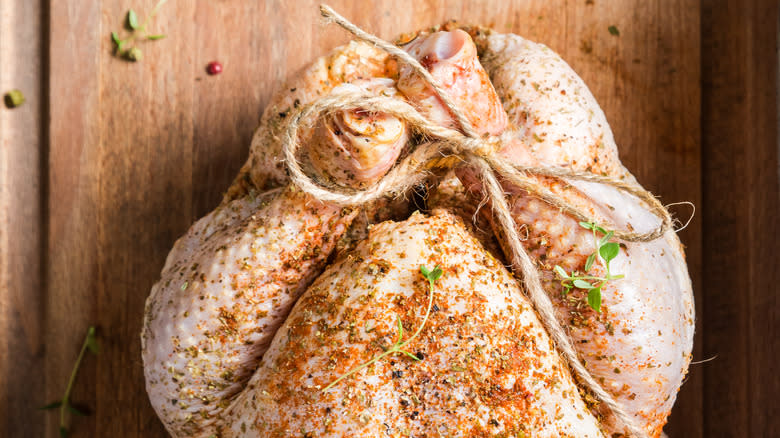
Tying together turkey legs is a tradition that many home cooks feel like they must do. In reality, however, you'll find several celebrity chefs not even mentioning such a thing when making a turkey, and we've set out to figure out why.
Interestingly, some camps are both for and against the act of "trusting," both of which claim that uneven cooking is the reason for and against the tradition. In one respect, trussing turkey is thought to help cook the turkey evenly so that no part of the bird ends up overdone. Similarly, those against trussing a turkey claim this method works a little too well by preventing air from getting to the legs, resulting in a breast that's overcooked and legs that aren't.
So which is which? Your guess is as good as ours. And from what we can tell from celebrity chef recipes, neither Gordon Ramsay nor Guy Fieri seem to think trussing is required (according to the steps mentioned in their recipes) while celebrity couple Patrick and Gina Neely seem to take trussing seriously. Which you choose is up to you; try both and gauge for yourself based on the results you get!
Do You Need Drippings To Make An Awesome Gravy?
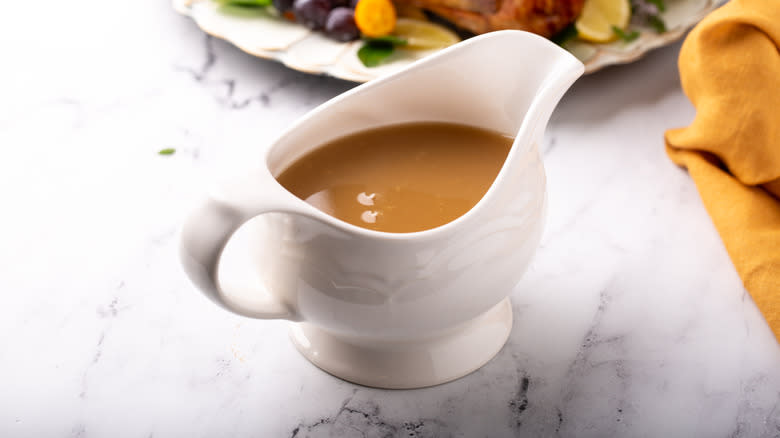
While you don't technically need drippings from turkey to make an awesome gravy, it can really help. And we aren't the only ones to think this; most celebrity chef recipes we've found include drippings from the turkey in some form to make a luscious sauce to ladle over turkey meat. Both Bobby Flay and Gordon Ramsay make use of turkey juices, though the two differ in what they add ingredient-wise to make those flavors come alive. We did find a gravy recipe from Ina Garten that uses no drippings at all, which lets us know that it's possible to come up with a scrumptious gravy using no drippings at all.
Thus, if you've got a turkey that has rendered enough juices, we definitely recommend not allowing all of that deliciousness to go to waste. However, if you've got a leaner bird or simply are intimidated by the thought of using turkey juices to whip up your gravy, you could easily use a chicken or turkey stock instead, and, as long as you've copped a good no drippings gravy recipe, we're willing to bet that few would notice.
Read the original article on Mashed.


